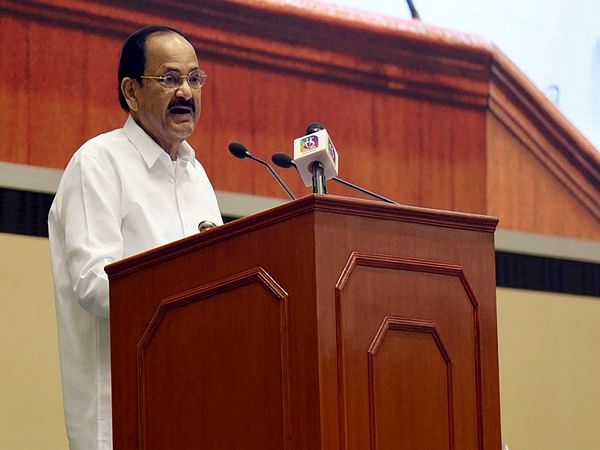New Delhi [India], March 15 (ANI): Vice President M. Venkaiah Naidu on Monday highlighted the importance of evidence-based policymaking to ensure that governance is responsive to the changes and disruptions around us.
He also called for constant rethink and readjustment of policies and programs as per emerging needs and requirements.
Interacting with the participants of ISB’s Advanced Management Programme in Public Policy (AMPPP) at Upa-Rashtrapati Nivas today, the Vice President called for developing innovative business models to find solutions to everyday problems faced by the common man such as solid waste management or monetization of crop waste to help farmers and check air pollution.
Stating that India is going through unprecedented transformation on every front, Naidu listed various reforms such as increased use of IT to ensure transparency and ease of service delivery, GST, RERA, and labour codes.
“These steps are leading to a better and conducive environment to do business in India,” he said.
Quoting the World Bank and IMF projections of the high growth rate of the Indian economy, the Vice President underlined that the country holds tremendous potential and opportunities for entrepreneurs and investors.
“To bring about the desired change, it is important that the government and private sector work together and build a better and stronger India,” he said.
Talking about the rapid pace of urbanization in India, the Vice President said it presents its own set of challenges and opportunities.
“Our policymakers will have to ensure that urban citizens have access to affordable housing, education, and healthcare,” he added, urging all states and the private sector to come together to make our cities vibrant and inclusive living spaces.
The Vice President called for bridging the urban-rural divide and said that “efforts must be made to make people in rural areas feel included as part of the developmental journey of the country”.
Stressing that the ultimate goal of any policy, innovation or institution is to make people’s lives happier and more comfortable, Naidu called for increasing people’s participation in governance and policy formulation. Stressing on the importance of the ‘delivery’ component of public services, the Vice President called for dynamism in policymaking and administration.
Describing agriculture as the mainstay of the Indian economy, the Vice President called for making every effort to ensure that our farmers get remunerative prices for their crops and their household incomes rise to decent levels. Towards this end, he wanted climate-resilient organic farming to be promoted in a big way. In this context, he cited the success of Sikkim in shifting to organic farming.
Noting that farmers are worst affected by the vagaries of the weather, Naidu suggested that the farming community should be incentivized to diversify cropping patterns and be encouraged to take up allied activities to make agriculture profitable. He also suggested that policymakers should study the low uptake of crop insurance in certain areas and find solutions for it.
The Vice President further said that the COVID-19 pandemic has highlighted the need for self-reliance in critical technologies and called upon everyone to strive for building an Atma Nirbhar Bharat.
“Let us build a strong, stable, peaceful, and prosperous India where there will be no poverty, illiteracy, gender and social discrimination,” he said.
Citing India’s recent success in developing its own indigenous COVID vaccine and achieving the milestone of more than 180 crore doses, Naidu exuded confidence that “nothing is impossible to achieve if India sets its sights on it”.
He appreciated the Indian School of Business for conducting the course with a special focus on Public Policy. The course titled – ‘Advanced Management Programme in Public Policy (AMPPP)’ is meant to hone the managerial skills of the working professionals in the public and private sectors.
The Vice President expressed hope that a mixed batch of private and public sector mid-career students will help in cross-learning from each other. (ANI)
This report is auto-generated from ANI news service. ThePrint holds no responsibility for its content.



